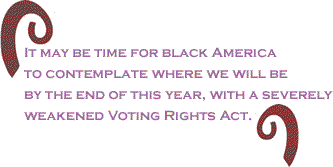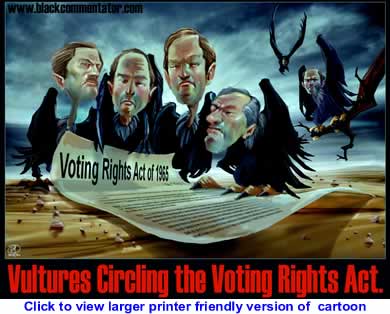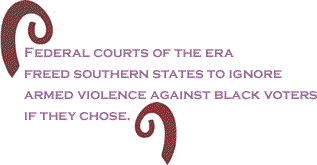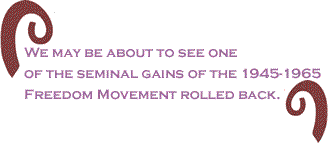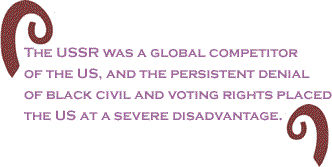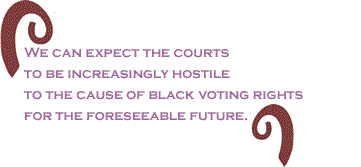
|
|||||||||||||||||||||
 |
|||||||||||||||||||||
 |
|||||||||||||||||||||
 |
|||||||||||||||||||||
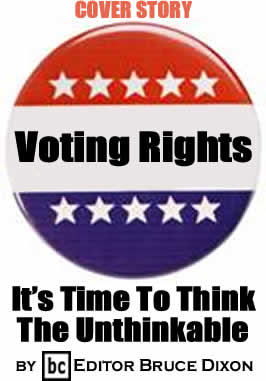 |
|
|
“Don't put that out there” is the admonition delivered
to folks impolite enough to talk about bad things which might happen
but have not yet come to pass, as if mere discussion or consideration
of some awful possibility makes it more likely. We at BC understand
politeness. But failing to recognize, to examine and to understand
unpleasant possibilities before they become devastating realities
is worse than impolite. It's foolish. The unpleasant truths of this political moment are: 1. Renewable portions of the Voting Rights Act of 1965
(VRA) seem increasingly likely to die in the Congress this session. 2. Recent Supreme Court decisions indicate the court is inclined
to “interpret”
permanent provisions of the Voting Rights Act into meaninglessness. 3. Democrats in the US. House and Senate seem disinclined to
fight very hard for the voting rights of blacks, and; 4. With no superpower rival on the international scene and the
domestic mass movement disbanded and sent home a generation ago,
the powers that be face little or no meaningful consequences at
home or abroad for killing the VRA. Significance of the Voting Rights Act of 1965 The University of Michigan’s Elizabeth Anderson and
Jeffrey Jones, in their excellent web offering titled The Geography of
Race in the US, identify five types of direct
disenfranchisement addressed by the Voting Rights Act of 1965.
These are violence against those who would register or vote, electoral
fraud, poll taxes, literacy tests, restrictive and arbitrary registration
practices, and white-only primary elections. The Civil War ended slavery, but left many questions
unsettled. The Reconstruction
governments, which opened up access to education and a measure of
equality before the law to former slaves, and which allowed blacks
to vote and hold office were swept aside in a wave of postwar violence
and bloodshed that southern whites called redemption.
This was the birth of the Ku Klux
Klan. Hundreds of black businesses and schools
were torched, their white and black teachers killed or driven away.
Armed gangs of whites confronted black voters at polling places
throughout the region. Ballot boxes were stolen, stuffed and destroyed.
Georgia was first to adopt the poll tax in 1871, and
in 1877 made the tax cumulative, which meant that if you were old
enough to vote ten years ago, before you could vote this year, you
had to prove that all your poll taxes for the past decades, were
paid along with interest and penalties. In a few years every former
Confederate state adopted the poll tax. Since most blacks were
sharecroppers who saw very little cash in the course of a year,
this measure alone cut the black vote by half. States made registration
inconvenient and inaccessible, introduced felony
disenfranchisement for offenses blacks were deemed more likely
to commit than whites, implemented literacy tests
and dozens of other measures. Courts conveniently ruled that the
Democratic Party, which was the White Man's party in the South of
that time, was a private and non-governmental organization, could
explicitly ban nonwhite voters from its primary elections, and the
whites-only
primary also became a southern staple.
So large was the segment of America’s white ruling
elite that objected to the VRA that the last two provisions could
only be attached to it on a temporary and renewable basis. It is
this renewal which is before Congress now. The Balance of Forces in 1965, and Today Passage of the 1965 Voting Rights Act was no easy
trick, and required a unique lineup of forces quite unlike anything
on the horizon today. In the legislative process, the VRA had as its chief
sponsor the president of the United States, Lyndon Baines Johnson.
An enthusiastic supporter of the VRA, and former Senate Majority
Leader during most of the 1950’s Johnson was famously effective
at bribing, cajoling, persuading and when necessary threatening
legislators to get his way.
And spurring presidents, judges, legislators, the
media and pundits of the time was a vast, decentralized and often
illegal mass movement with inroads and a presence in virtually every
black community across the land. Though many of the movement’s
principals espoused Ghandhian nonviolence, not all did, and an even
greater number had a healthy disrespect for the law. The willingness
to encourage masses of people to step outside the law when the occasion
demanded it was in fact, central to Dr. Martin Luther King’s version
of nonviolence “We contend that the law
that is broken must be broken openly, cheerfully, lovingly and with
a willingness to accept the penalty. I submit that any individual
who disobeys a law that conscience tells him is unjust and is willing
to pay the penalty by staying in jail, if necessary in order to
arouse the conscience of the community concerning the injustice
of that law, is at that moment expressing the very highest respect
for the law.” It was common, for instance, for mobilizations of the 1960s to empty a town or a city’s high schools to put bodies in the street in defiance of the writ of judges, legislators and local sheriffs. The Freedom Movement, as most of its knowledgeable actors called it, was the engine behind the end of Jim Crow and the adoption of the Voting Rights Act of 1968.
Instead of an activist, pro-civil rights president
we have George W. Bush, whose abysmal record and willingness to
pander to racism at every opportunity speaks for itself. Republican
leaders in the House and Senate earlier this summer were shouted
down in their own caucus by legislators who opposed the VRA, causing
their leaders to table it for the time being. Whether Republican
leaders will bring it up again, and in what form is anybody’s guess.
Whether they will be willing to put the screws to reluctant Republicans
to vote for it is even more doubtful. For their part, savvy Democrats
like Minority Leader Nancy Pelosi calculated that yanking the names
of all the Congress’s black members from co-sponsorship improved
its chances for passage. But even after removing the offending
faces of black legislators from co-sponsorship, no white national
Democrat has been willing to step up and be the face and point person
for this legislation, telling Americans why we still need a VRA. In 1965, at least some of the federal judiciary supported
the cause of black voting rights. But no more. Rightists have
been campaigning against suspected liberals on the bench since Brown
v. Board of Education in 1954. The radical rightist Federalist
Society is widely believed to have exercised a near monopoly
of clerkships for federal judges for some
time now. And federal appellate judges have lifetime tenure.
Hence we can expect the courts to be increasingly hostile to the
cause of black voting rights for the foreseeable future. Nowadays, the US has no rival on the world stage.
American politicians openly proclaim their disrespect for international
law or international anything, and their disdain for world opinion.
Ignorant politicos who ascribe foreign criticism to jealousy, and
“they hate our freedom” are treated as though they talk sense.
As BC co-publisher Glen Ford reminded
us in a January 2005 cover story. Now that Blacks had the
vote, North and South, some sectors of African Americans
decided it was time to get out of the streets so that a few Blacks
might occupy high political offices and corporate suites. The masses
would be summoned every few years at election time, or to celebrate
the latest entrepreneurial acquisition or corporate promotion among
the thin slice of Blacks who had, indeed, been set “free at last”
by the civil rights gains of King’s unfinished movement. With
few or no visible powerful advocates in any branch of government,
without much support in the corporate mass media, with American
authorities determined to ignore world opinion and with the mass
movement sent home a generation ago, it may be time for black America
to contemplate where we will be by the end of this year, with a
severely weakened Voting Rights Act. We may be about to
see one of the seminal gains of the 1945-1965 Freedom Movement rolled
back. Some
have said that we marched in the Sixties and got the VRA, we marched
in the Seventies and the war went away. We should march again.
That’s probably true. But the custom nowadays is for marches to
look more like picnics, and for everybody to go home the next day.
That’s not how it worked in Belarus or the Philippines and it’s
not now it worked here forty years ago. Back in the day, people
stayed in the street till something changed. A march is one day.
A movement continues till it obtains a victory or something changes.
Or until misguided leaders send it home. |
|
| Home | |
Your comments are always welcome. Visit the Contact Us page to send e-Mail or Feedback or Click here to send e-Mail to [email protected] e-Mail re-print notice
If you send us an e-Mail message we may publish all or part of it, unless you tell us it is not for publication. You may also request that we withhold your name. Thank you very much for your readership. |
|
| July 13, 2006 Issue 191 |
||||||||||||||
|
||||||||||||||
|
||||||||||||||
| Printer Friendly Version in resizeable plain text format | ||||||||||||||
 |
||||||||||||||
 |
||||||||||||||
 |
||||||||||||||
 |
||||||||||||||
| |
||||||||||||||
| |
||||||||||||||





















